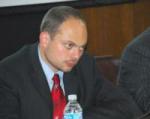
More than 20,000 Muscovites gathered Saturday on Andrei Sakharov Avenue — the site of the mass anti-Putin protests in 2011 — to demand that the authorities rescind their ban on opposition candidates participating in a crucial Moscow election. “We do not exist for them, they only notice us when it’s time to pay taxes,” Alexei Navalny, Russia’s most prominent anticorruption activist, told the rally. “From now on, there will be no taxation without representation. … I am proposing a peaceful public compromise: either you register every candidate, or next Saturday we will gather for a rally at Moscow City Hall!”
The election for the Moscow City Duma — the legislative body that passes laws and adopts the budget for Russia’s 12-million-strong capital and its most important political center — will be held on Sept. 8. But the most consequential fraud has already been committed. Last week, Moscow’s electoral commissions — bodies that are supposed to act as impartial arbiters in administering elections but are in reality the first line of defense for the incumbent government — disqualified nearly all viable opposition candidates from the ballot.
For weeks, some of Moscow’s (and Russia’s) best-known democracy activists — including Dmitri Gudkov, once the lone opposition voice in the country’s parliament; Ilya Yashin, a colleague of the late opposition leader Boris Nemtsov who was recently elected to lead one of the city’s municipal districts; and Lyubov Sobol, the lead lawyer at Navalny’s Anticorruption Foundation — raced to meet an impossible threshold: collect some 5,000 signatures each to get on the ballot. The task was made more formidable not only by logistical challenges in the midst of the vacation season, but also because each signature on the petition means volunteering one’s personal information for the government’s database of opposition supporters.
Amazingly, most of the candidates succeeded and duly submitted signatures for registration. In nearly every case, they were disqualified for “irregularities” on the petitions. Naturally, most irregularities were created by the commissions themselves, whose official experts invalidated signatures by deliberately adding misprints to names or identity document numbers when cross-checking them against police databases. Voters whose signatures were ruled invalid included Sobol’s former law professor, Elena Lukyanova; Viktor Sheinis, a co-author of the Russian constitution; and Yashin himself. When some tried to appeal to the commissions in person, they were ignored. “We have no reason to doubt our experts,” retortedDmitri Reut, a member of the Moscow city electoral commission. There is not much one can do when the referee is playing for one of the competing teams.
Fraud in Russian elections under Vladimir Putin is nothing new. It has been a staple of the system for years and has been documented by international bodies, from the observer missions of the Organization for Security and Cooperation in Europe to the European Court of Human Rights. This time, however, there is a difference. Those disqualified from the 2019 Moscow ballot are not just opponents who could speak the inconvenient truth to voters during the campaign. Many of them are, in fact, sure winners in their districts who can reshape the face of Moscow’s legislature and, with it, of Russian politics — just as the opposition’s recent victory in Istanbul changed the political landscape of Recep Tayyip Erdogan’s Turkey.
Yashin, for example, leads the pro-government candidate among likely voters in his district 33 percent to 5 percent, according to a poll by the independent Levada Center. Others, including Gudkov and Elena Rusakova, the head of another Moscow district and member of the liberal Yabloko party, reportedly enjoy similar standing. Kirill Goncharov and Andrei Babushkin, also of Yabloko, finished in close second place in their districts in 2014 and had every chance of topping the poll this time. In a further sign of the Kremlin’s awareness of its declining political fortunes, Putin’s United Russia party did not formally nominate a single candidate for the Moscow election. In every case, pro-government candidates are running as “independents.”
“There are many motivated people around me who are ready for action,” Rusakova wrote after being removed from the ballot. “In order to gather signatures and then defend them, we had to create organizational structures that involved tens of thousands of people [and] that informed hundreds of thousands. A great many have become participants. … They are only approaching the starting line.”
Moscow Mayor Sergei Sobyanin "managed in a month what Putin couldn’t in 20 years,” Yashin said, referring to the fact that various factions of Russia’s democratic opposition have put aside their differences and joined in the Moscow protests.
“When the authorities so brazenly … ban ‘undesirable’ citizens from elections, what do they expect to happen next?” asked Alexander Kynev, a prominent Russian political analyst. “Do they expect ‘undesirables’ and thousands of their supporters to disappear? To move abroad? To fall in love with Putin and Sobyanin? … I just want to know whether they understand what will happen next.” Even if the Kremlin doesn’t have the answer, history has provided one on several occasions. When power cannot be changed at the ballot box, it will, sooner or later, be changed on the streets.
























